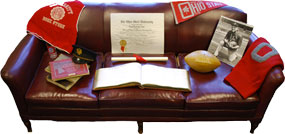We’d like to tell you about three former OSU staff members whose recent deaths remind us of their significant impact the campus community:
Ray Bugno, who died January 6 at the age of 94, was deputy director of the OSU Research Foundation for 38 years, from 1949 to his retirement in 1987. But Bugno was on campus long before he started working at OSURF. His family rented a house on
Woodruff Avenue (where the Fisher College of Business stands now) from former Athletics facilities manager Tony Aquila, who had hired Ray’s father in 1926 to work for him.
In 1936, Bugno started working during the summers for the University, when he was a teenager, and his first full-time job was in Stores and Receiving, in 1940. He worked there until 1943 when he entered military service. When he returned from World War II, he became a student, and he earned his bachelor’s degree from the College of Commerce in September 1949.
That same year, in November, the Research Foundation needed someone to create a new inventory system to meet the requirements of government contracts. Having such experience at Stores, Bugno applied and got the job. Bugno spent more than half of his OSURF career as deputy director of the Sponsored Programs Administration where he was responsible for project administration, accounting, purchasing and reprographics. One of his most important roles was as National Security Officer for OSURF, a job in which he helped faculty gain national security classification for federal research projects.
In 1988, Bugno received the University’s Distinguished Service Award for a career of outstanding service to the OSU community.
John J. Clarke, who died last August at the age of 90, served as a journalism professor at the University for 19 years, from 1967 to
1986. During that time, he served as advisor to The Lantern, where he implemented a computer system to make the daily production of the newspaper much faster and more precise. He also established a program through the journalism department for young editors to place them in internships in newsrooms all over the country.
First, though, Clarke had a distinguished newspaper career. After receiving a master’s degree in journalism from Columbia University, Clarke worked as a reporter for the Providence, R.I., Journal-Bulletin. There, he was part of a team that won a Pulitzer Prize in 1952 for local news reporting for its coverage of a bank robbery in which a police officer was killed. Afterwards, Clarke worked for the Scranton, Pa., Times until he was hired at OSU in 1967 to teach journalism, particularly editing, and serve as advisor to The Lantern.
While at OSU and after his retirement, Clarke directed a copy editing internship program for the
Dow Jones Newspaper Fund, from 1970 to 1991. Journalism students from around the country would be invited to OSU during the summer for an intensive, two-week instruction program in editing. They then would be placed in professional newsrooms throughout the U.S. Former participants went on to careers at such prominent newspapers as The Los Angeles Times, The Boston Globe and The Miami Herald.
Clarke retired from OSU in 1986, the same year he received the Distinguished Teaching in Journalism Award from the Society of Professional Journalists.
Ilsedore Edse, who died in December at the age of 97, was a German professor for 22 years, from 1956 to her retirement in 1988.
During that time, Edse not only taught German to campus students, but educated people on German language and culture through roughly a quarter-century of radio and television broadcasts.
Raised in Koblenz, Germany, Edse came to the U.S. in 1946 with her husband, Rudolph, who had been recruited to work on the American space program. Her husband eventually became director of OSU’s rocket research laboratory in the Department of Aeronautical Engineering.
Edse earned her bachelor’s, master’s and doctoral degree from OSU, and she began teaching German while she was working on her doctorate. It was during this time, in 1954, that she was asked by another professor to do a daily German instruction program on WOSU-AM. After the other professor stopped participating, Edse carried on alone. She later added a monthly radio program on German opera. In 1957, Edse began her television career on WOSU-TV with a twice-monthly live program called “Die Deutsch Stunde” (“The German Hour”). In that half-hour program, Edse would teach the language through skits, satiation comedy and other visual means.
For her program, Edse received two Emmy Award nominations, and she received many accolades for her teaching and broadcasting. The most satisfying may have been from her native country: in 1980 West Germany awarded her its highest honor – the Bundesverdienstkreuz (Order of Merit of the Federal Republic of Germany) – for her distinguished contributions to intercultural understanding.








Recent Comments